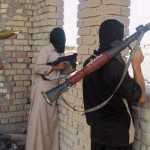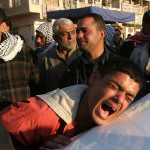There’s nothing in the street, Looks any different to me
And the slogans are replaced, by-the-bye
And the parting on the left, Is now the parting on the right
And the beards have all grown longer overnight
I’ll tip my hat to the new constitution, Take a bow for the new revolution
Smile and grin at the change all around me
Pick up my guitar and play, Just like yesterday
Then I’ll get on my knees and pray
We don’t get fooled again
Don’t get fooled again
Meet the new boss, same as the old boss.
The Who
 1968, President Richard Nixon was elected on a promise of ending the Vietnam War. Nixon coined the phrase Vietnamize the war meaning to turn over the responsibility of combat to the South Vietnamese, to facilitate the return of all American combat troops. Prior to making good on his campaign promises, President Nixon ordered more U.S. combat troops into Cambodia, which intensified combat further. This was also followed by increased anti-war sentiments from the already battle fatigued American public. Nixon was committed to the ideal that America must end the war honorably, which was translated to mean, winning the war. Congress then repealed the Gulf of Tonkin Resolution and halted funding for the war in Vietnam. Free elections were to be held and the Paris Accord went into effect. The U.S. agreed to remove all combat troops and they did. America’s strong arms were no longer there to protect South Vietnam’s democratic infancy and Saigon fell to the North Vietnamese. By 1975, the Army of the Republic of South Vietnam had collapsed and in the vacuum left by our withdrawal was a resentful South Vietnamese people who were then faced to defend their poorly prepared nation. Enter the Khmer Rouge, a clandestine murderous Communist backed party led by Pol Pot. After the fall of Saigon, the Khmer Rouge subjected North Vietnamese citizen into a brutally enforced agrarian-based communist society. Approximately 2 million people were tortured and murdered or starved to death in the wake of the new social engineering of Cambodian society. Those murdered were primarily the intellectual elite who may harbor ideas that were threatening to socialist ideals. Children were separated from parents, who were thought to have corrupted their children’s thinking and the Khmer Rouge killed anyone who may be involved in free-market activities. The Khmer Rouge may have exterminated as many as 7 million people in their reign from 1975 thru 1979. They have been called the most lethal regime of the 20th century. The motto offered to the South Vietnamese people by the Khmer Rouge, “To keep you is no benefit, to destroy you is no loss.”
1968, President Richard Nixon was elected on a promise of ending the Vietnam War. Nixon coined the phrase Vietnamize the war meaning to turn over the responsibility of combat to the South Vietnamese, to facilitate the return of all American combat troops. Prior to making good on his campaign promises, President Nixon ordered more U.S. combat troops into Cambodia, which intensified combat further. This was also followed by increased anti-war sentiments from the already battle fatigued American public. Nixon was committed to the ideal that America must end the war honorably, which was translated to mean, winning the war. Congress then repealed the Gulf of Tonkin Resolution and halted funding for the war in Vietnam. Free elections were to be held and the Paris Accord went into effect. The U.S. agreed to remove all combat troops and they did. America’s strong arms were no longer there to protect South Vietnam’s democratic infancy and Saigon fell to the North Vietnamese. By 1975, the Army of the Republic of South Vietnam had collapsed and in the vacuum left by our withdrawal was a resentful South Vietnamese people who were then faced to defend their poorly prepared nation. Enter the Khmer Rouge, a clandestine murderous Communist backed party led by Pol Pot. After the fall of Saigon, the Khmer Rouge subjected North Vietnamese citizen into a brutally enforced agrarian-based communist society. Approximately 2 million people were tortured and murdered or starved to death in the wake of the new social engineering of Cambodian society. Those murdered were primarily the intellectual elite who may harbor ideas that were threatening to socialist ideals. Children were separated from parents, who were thought to have corrupted their children’s thinking and the Khmer Rouge killed anyone who may be involved in free-market activities. The Khmer Rouge may have exterminated as many as 7 million people in their reign from 1975 thru 1979. They have been called the most lethal regime of the 20th century. The motto offered to the South Vietnamese people by the Khmer Rouge, “To keep you is no benefit, to destroy you is no loss.”
The murderous regime of the Khmer Rouge was definable, and they were visible. The violent actions were driven by a deep belief that if citizens did not believe as they did, their deaths would be no loss.
2008, President Barack Obama was elected, among other campaign promises, to bring U.S. combat troops home from Iraq within 16 months. President Obama said, “The best way to press Iraq’s leaders to take responsibility for their future is to make it clear that we are leaving.” Obama pledged to, “seek a new accord on Iraq’s Constitution and governance.” Recently after bringing home all but 50,000 support and training troops, Mr. Obama said, “The bottom line is this: The war is ending. Like any sovereign, independent nation, Iraq is free to chart its own course. And by the end of next year, all of our troops will be home.”
According to an August 2007 paper published by the Center for Strategic and International Studies (CSIS), the challenges faced in preparing a cohesive Iraqi Security Force (ISF) are complex and multi-dimensional. “Success depends on realism and resources. Overly optimistic conceptions of ISF development already have done much to breed a climate of distrust and fuel the pressure to withdraw. There is also a serious risk that both the US and Iraq will rely on false optimism and illusions for very different political reasons. The US increasingly wants out; the Iraqi government increasingly wants the US presence altered and reduced to support its own internal political objectives. “
Regarding the timeline set by President Obama, Iraqi national security adviser Mowaffak al Rubaie stated, “to be able to defend Iraq cannot be done overnight, or in months. It will take decades to build an air force and to build a navy. People are trying to fit or to sync the Iraqi clock to the Washington clock,” when in fact, “we need to sync the Washington clock to the Baghdad clock.”
Retired Maj. Gen. John Landry, a member of the intelligence council, said in regards to ISF preparedness, “Iraqi security forces are so plagued by sectarianism, poor logistics, and weak support capabilities that they would not be able to successfully transition control.” When asked if ISF forces were capable of providing some sort of successful closure to US involvement in Iraq, Landry stated this was “not likely” and that Iraqi military leadership and capability needed “years to develop, not months.”
 Marine Commandant General James Conway commented on the problems that exist in the unification of ISF forced in the face of sectarian feelings and the potential that yesterday’s insurgents are today’s Iraqi soldiers. “There’s no doubt about that. More generally, however, many Iraqi Army and National
Marine Commandant General James Conway commented on the problems that exist in the unification of ISF forced in the face of sectarian feelings and the potential that yesterday’s insurgents are today’s Iraqi soldiers. “There’s no doubt about that. More generally, however, many Iraqi Army and National
Police units that were actively in combat in areas like Baghdad had officers with clear ties to the Shi’ite militias and were involved or tolerated sectarian cleansing.
Kurdish units serving the central government also had their primary loyalty to Kurdish leaders, but this has been far less of a problem to date because they have not had to operate in areas with ethnic clashes between Arab and Kurd. In fact, some Iraqi Army brigades that were formally in the Kurdish areas have been among the best performing Brigades in Baghdad. The regular police were almost all more loyal to local leaders, tribes, sects, and their ethnicity than the central government.”
General David Petraeus commented, “The sectarian character of the police is a significant challenge to force development, “up to 70% of Iraqi police leaders had been replaced because they had ties to sectarian violence.” Brig. Gen. Pittard reported, “local police were still susceptible to militia infiltration, and that sectarian loyalty still needed to be actively addressed among these units
In Iraq, the American military leaders have tried to instill the Iraqis with a Nationalistic pride. The problem is however, that there is no unified Iraq to unify. When Sunni officials are empowered, Shia leaders are threatened and visa versa. There have always been sectarian beliefs in Iraq and perhaps even before the citizens of Iraq consider the unified Iraq, they must first consider ethnic tolerance. At a time when the future security of Iraq is based on the level of individual patriotism for Iraq, it remains to be seen if national patriotism can overcome sectarianism and fear.
Historically we have not seen countries respond well to the U.S backed train, fight and withdrawal playbook. Iraq will present an even greater challenge due to the presence of outside insurgency threatening and already fragile sectarian relationship. If the U.S. is indeed leaving a poorly or un-prepared Iraq, civil war is an unfortunate certainty.
When compared to the Vietnam War and ultimate civil war, Iraq has numerous complex differences. In Vietnam, the basic conflicting ideals were that of a socialist dictatorship and a democratic regime. The two-sides were distinct and defined. Peace talks could be arranged and agreements, though fragile, were at least a potential. In Iraq, there is not a clear cut “two-sided conflict.” Iraq is a predominantly tribal society and as a tribal society, Iraqi’s have deeply divided religious and sociological foundations all of which operate within the Muslim faith. Given that these sectarian views are first and foremost in the citizens belief system, it will be difficult, if not impossible to expect any unified military or police effort to progress. The Iraqi people are terrified that when the U.S. presence ends, lawlessness will once again be the rule and any nationalistic alliances forged will be the cause of extreme violence against them.
 Vietnam was essentially a strategic block of land where the fights between the Soviet Union and the U.S. could occur on a smaller scale and without nuclear war occurring. South Vietnam was of no interest to anyone, with the exception of North Vietnam. Iraq however, is the third largest oil producing country in the world and access to this oil, as well as stability of the Middle East is a strategic imperative. Today our enemy is not communism, but radicalism. Al Qaeda is not a definable fighting force, but instead is a pervasive ideal that cannot be attacked with traditional weapons. There is a war for the hearts and minds of Iraqis, and as much as the U.S. has struggled to provide a positive image of democracy, we may have misjudged the images that the average Iraqi already has. If Iraq remains peaceful and free to, chart their own future,” as President Obama has said, then the perception of American involvement will be favorable. If Iraq is prepared to secure their borders and work together to maintain security and order, then the view of American involvement will be favorable. If however, insurgents apply pressure through attacks and threats of eventual ethnic retaliation, and the population begins to feel even the slightest degree of insecurity or corruption in the Iraqi government or the Iraqi Security Force, then there will be mass panic heralding in a civil war. The tragic outcome of a breakdown of this nature is that al Qaeda will be more than happy to exploit this weakness, thus resulting in greater propagation of the myth of al Qaeda and greater weakening of the already weak American self-identity.
Vietnam was essentially a strategic block of land where the fights between the Soviet Union and the U.S. could occur on a smaller scale and without nuclear war occurring. South Vietnam was of no interest to anyone, with the exception of North Vietnam. Iraq however, is the third largest oil producing country in the world and access to this oil, as well as stability of the Middle East is a strategic imperative. Today our enemy is not communism, but radicalism. Al Qaeda is not a definable fighting force, but instead is a pervasive ideal that cannot be attacked with traditional weapons. There is a war for the hearts and minds of Iraqis, and as much as the U.S. has struggled to provide a positive image of democracy, we may have misjudged the images that the average Iraqi already has. If Iraq remains peaceful and free to, chart their own future,” as President Obama has said, then the perception of American involvement will be favorable. If Iraq is prepared to secure their borders and work together to maintain security and order, then the view of American involvement will be favorable. If however, insurgents apply pressure through attacks and threats of eventual ethnic retaliation, and the population begins to feel even the slightest degree of insecurity or corruption in the Iraqi government or the Iraqi Security Force, then there will be mass panic heralding in a civil war. The tragic outcome of a breakdown of this nature is that al Qaeda will be more than happy to exploit this weakness, thus resulting in greater propagation of the myth of al Qaeda and greater weakening of the already weak American self-identity.
 August 19th 2010: The last combat troops leave Iraq. August 27th, 13 Iraqi cities are attacked by synchronized bombings. 56 people are killed and hundreds wounded. The following day, 6 Government allied fighters were ambushed and killed by insurgents. Wael Abdel-Latif, a former Iraqi judge and former lawmaker states, “The message the insurgents want to deliver to the Iraqi people and the politicians is that we exist, and we choose the time and place,” “They are carrying out such attacks when the Americans are still here, so just imagine what they can do after the Americans leave.”
August 19th 2010: The last combat troops leave Iraq. August 27th, 13 Iraqi cities are attacked by synchronized bombings. 56 people are killed and hundreds wounded. The following day, 6 Government allied fighters were ambushed and killed by insurgents. Wael Abdel-Latif, a former Iraqi judge and former lawmaker states, “The message the insurgents want to deliver to the Iraqi people and the politicians is that we exist, and we choose the time and place,” “They are carrying out such attacks when the Americans are still here, so just imagine what they can do after the Americans leave.”
At the end of Vietnam there was U.S. reparations. To accept that farmers were paid $600 for each banana tree destroyed, while families were paid $150 for a child killed, is beyond obscene. What then will be the long-term cost of the U.S. or more politically correct, the Multi-National Forces, involvement in Iraq? It would seem that money is no longer the currency needed to pay reparations, but instead there is a price far greater. The cost of abandoning the Iraqi people in the event of an actual civil war, or worse, being guilty of weakening the Iraqi’s ability to defend themselves, would lead to a shift in radical Islamic new believers that the world has never before seen. Just as Hitler was dedicated to world dominance and ethnic cleansing, al Qaeda is also dedicated to devote each and every life in the pursuit of the same goal. Pol Pot was a murderous brutal dictator and the Khmer Rouge just as dedicated to brutality. The difference was in leadership. The adage of cutting the head off the snake kills the snake, does not hold true to the current multi-headed snake that appears to become stronger and bolder with each attempt to destroy it. It is clear that if political ambition is the deciding factor for the end of combat actions in Iraq, then surely it is a battle we will revisit.
August 28, 2010:
The Islamic State of Iraq, a coordinating group for al-Qaeda militants, posted a statement taking responsibility on its Web site taking credit for attacking “the headquarters, centers, and security barriers of the apostate army and police” with assaults that were “the wings of victory sweeping again over a new day,”



Paul, you have many talents my friend. Well done!
I think it is for the best that the American troops will soon leave Iraq so that they can now stand on their own. I just hope that their leader will be able to handle crisis and be able to minimize if not, stop chaos in their land.